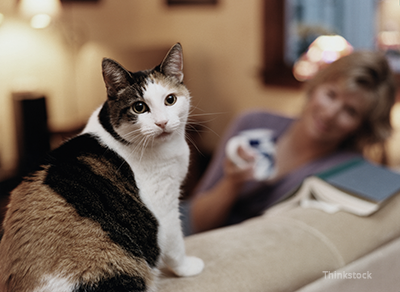
Perhaps the most important thing to know about kidney disease in cats is that way too many cats are affected by it. In fact, studies show that 1 in 3 cats suffer from kidney disease, reports Dr. Celeste Clements. Cats can get kidney disease for any number of underlying reasons, and even worse, it’s difficult to spot. Most cats show no outward signs of kidney disease until the problem is very advanced. Even when they do, the first signals of kidney disease in cats are easy to miss, including subtle weight loss, urinating/peeing more often and drinking more water. Therefore, if you notice your cat is peeing on the floor, soaking the litter box, or if your cat is always thirsty, it’s time to visit your veterinarian.
However, once these signs are present, there’s typically already been a great deal of kidney damage. Fortunately, new advances in the veterinary world are making it easier to find kidney disease in cats earlier (even without signs being present).
What is kidney disease in cats?
Kidney disease in cats is notoriously hard to catch early and can have devastating effects on our feline friends. In general, kidney disease (sometimes called “kidney failure”) happens when your cat’s kidneys stop doing their job as well as they should. (Learn more about what kidneys do for your cat.) This damage, once done, is usually permanent and can be caused by a variety of issues. (Learn more about 10 common causes of kidney disease in cats.)
Kidney disease in cats is classified in two primary ways, as:
- Chronic kidney disease in cats
- Acute kidney injury in cats
Learn more about kidney disease in cats:
Since kidney disease impacts so many cats and early detection is so critical, it’s a great idea for any cat parent to learn and know everything you can about the disease. We’ve included some in-depth articles about kidney disease in cats and additional tools below, as well as a quick quiz and tips for helping keep your cat’s kidneys as healthy as possible for the long-haul:
- 6 Surprising Facts About Kidney Disease in Cats
- Chronic Kidney Disease: What Does Kidney Failure in Cats Really Mean?
- 10 Common Causes of Kidney Disease in Cats
- Kidney Problems In Cats: Test Your Know-How With Our Quiz!
- Kidney Stones in Cats: What You Need to Know
- Kidney Disease in Cats 101
- 5 Things Vets Hate About Kidney Disease in Cats … And How That’s About to Change
Kidney disease quick tips:
- Kidney disease is a leading cause of suffering and death in cats,3 and has been so difficult to combat because it was often not detected until most of the damage was done and permanent.
- Certain factors like kidney stones, urinary tract infections, or hereditary conditions could make kidney disease more likely.
- Encouraging your cat to drink more water can help with kidney health
- As cats age, the likelihood of developing kidney disease increases. In fact, more than half of cats over age 15 are afflicted.1
- The IDEXX SDMA™ Test is a breakthrough that not only screens for kidney disease, but can detect this devastating disease months to years earlier than previously possible.3[Editor’s Note: IDEXX Laboratories is the parent company of Pet Health Network.]
There’s much more to learn about chronic kidney disease if you want to protect your cat, and having this knowledge is step one in the fight against a disease that has claimed far too many lives. Check out the resources above, and ask your veterinarian what you can be doing to keep your cat healthier, happier and in your life for longer.
A new test is available to help detect kidney disease earlier,
ask your veterinarian about the new IDEXX SDMA test.
Learn about
IDEXX SDMA testing

More Kidney Disease Resources
- 6 Surprising Facts About Kidney Disease in Cats
- Chronic Kidney Disease: What Does Kidney Failure in Cats Really Mean?
- 10 Common Causes of Kidney Disease in Cats
- Kidney Problems In Cats: Test Your Know-How With Our Quiz!
- Kidney Stones in Cats: What You Need to Know
- Kidney Disease in Cats 101
- 5 Things Vets Hate About Kidney Disease in Cats … And How That’s About to Change
If you have any questions or concerns, you should always visit or call your veterinarian -- they are your best resource to ensure the health and well-being of your pets.
